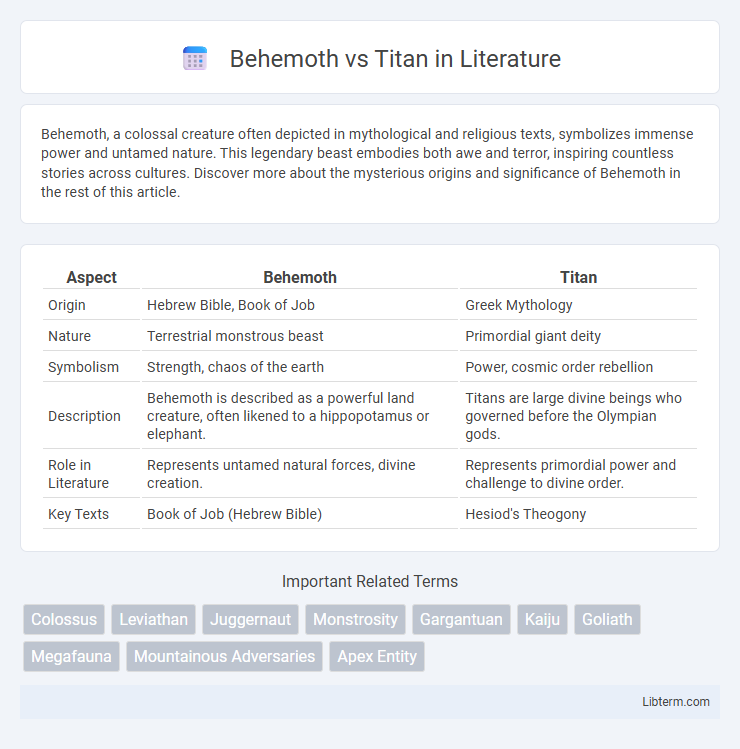Behemoth, a colossal creature often depicted in mythological and religious texts, symbolizes immense power and untamed nature. This legendary beast embodies both awe and terror, inspiring countless stories across cultures. Discover more about the mysterious origins and significance of Behemoth in the rest of this article.
Table of Comparison
| Aspect | Behemoth | Titan |
|---|---|---|
| Origin | Hebrew Bible, Book of Job | Greek Mythology |
| Nature | Terrestrial monstrous beast | Primordial giant deity |
| Symbolism | Strength, chaos of the earth | Power, cosmic order rebellion |
| Description | Behemoth is described as a powerful land creature, often likened to a hippopotamus or elephant. | Titans are large divine beings who governed before the Olympian gods. |
| Role in Literature | Represents untamed natural forces, divine creation. | Represents primordial power and challenge to divine order. |
| Key Texts | Book of Job (Hebrew Bible) | Hesiod's Theogony |
Introduction to Behemoth and Titan
Behemoth and Titan are mythical creatures often depicted in ancient texts and folklore, with Behemoth described as a colossal land beast symbolizing immense strength and power. Titan refers to a race of giants in Greek mythology, embodying primal forces and often representing chaos or elemental power. Both entities are central to various mythological narratives that explore themes of creation, destruction, and cosmic balance.
Origins and Mythological Backgrounds
Behemoth originates from Hebrew mythology, described in the Book of Job as a colossal land beast symbolizing primal chaos and God's creation power, often interpreted as a hippopotamus or mythical creature embodying strength. Titan comes from Greek mythology, representing an ancient race of giant deities descended from Uranus (Sky) and Gaia (Earth), known for their immense size and power during the primordial era before the Olympian gods. Both Behemoth and Titans symbolize fundamental cosmic forces and chaos in their respective mythologies, highlighting the struggle between order and disorder in ancient narratives.
Physical Characteristics Compared
Behemoth boasts massive muscular limbs, a broad chest, and thick, armored skin that offers exceptional durability, while Titan features towering height, elongated limbs, and dense bone structure enhancing its reach and power. Behemoth's compact, heavily muscled frame allows for explosive strength and close combat agility, contrasting with Titan's leaner, towering build optimized for overwhelming force and long-range strikes. The scale of Behemoth's bulk versus Titan's height highlights the primal brute strength against towering dominance in their physical confrontation.
Powers and Abilities: Behemoth vs Titan
Behemoth possesses immense physical strength, regenerative capabilities, and earth manipulation powers, allowing it to create seismic tremors and control the battlefield environment. Titan, on the other hand, features colossal size, advanced durability, and energy projection, capable of launching devastating energy blasts and withstanding massive damage. The confrontation between Behemoth's raw elemental control and Titan's overwhelming force and energy attacks highlights a clash of primal power versus technological might.
Cultural Significance and Symbolism
Behemoth and Titan embody vast, primal forces symbolizing chaos and power across different mythologies, with Behemoth often representing earthbound brute strength in Jewish lore and Titan symbolizing celestial might in Greek mythology. Both creatures serve as cultural metaphors for humanity's struggle to understand and dominate the natural and divine realms. Their enduring presence in literature and art reflects deep-rooted archetypes of cosmic order versus disorder, shaping cultural identities and spiritual beliefs.
Appearances in Popular Media
Behemoth and Titan frequently appear in popular media as colossal creatures symbolizing overwhelming power and ancient mystery. Behemoth is often depicted in fantasy games and literature as a monstrous beast embodying brute strength, while Titan appears prominently in science fiction and mythology-inspired films as giant humanoid entities or colossal natural forces. Both are featured in video games like "Final Fantasy" (Behemoth) and "Attack on Titan" (Titans), highlighting their cultural impact and enduring fascination in modern storytelling.
Strengths and Weaknesses Analysis
Behemoth showcases immense brute strength and armored durability, excelling in close-quarters combat but suffers from limited agility and slower attack speed compared to Titan. Titan compensates with superior reach, advanced weaponry, and tactical versatility, making it effective for ranged engagements while its lighter armor renders it vulnerable in prolonged melee exchanges. Understanding the balance between Behemoth's raw power and Titan's agility is crucial for optimizing combat strategies against each opponent.
Iconic Battles and Conflicts
Behemoth and Titan have clashed in numerous iconic battles, symbolizing the eternal struggle between colossal forces of nature and mythology. Their conflicts are characterized by earth-shattering impacts and legendary showdowns recorded in folklore and popular culture. These battles often depict the struggle for dominance over realms, inspiring countless adaptations in literature, film, and gaming.
Influence on Modern Storytelling
Behemoth and Titan serve as archetypal forces in modern storytelling, symbolizing overwhelming power and chaos that challenge heroes and civilizations. Their mythological roots from biblical and ancient sources shape narratives in literature, film, and video games by embodying primal fears and the struggle between order and destruction. These colossal entities influence contemporary genres by inspiring epic battles, world-altering conflicts, and explorations of human resilience against formidable adversaries.
Conclusion: Who Reigns Supreme?
Behemoth and Titan represent colossal forces in mythology and popular culture, each embodying immense power and destructive potential. The Behemoth is often depicted as a massive, land-dwelling creature symbolizing raw strength and endurance, while the Titan is portrayed as a giant deity with divine authority and cosmic influence. In terms of supremacy, Titans generally reign supreme due to their mythological status as primordial gods possessing both supernatural abilities and commanding control over natural elements.
Behemoth Infographic

 libterm.com
libterm.com